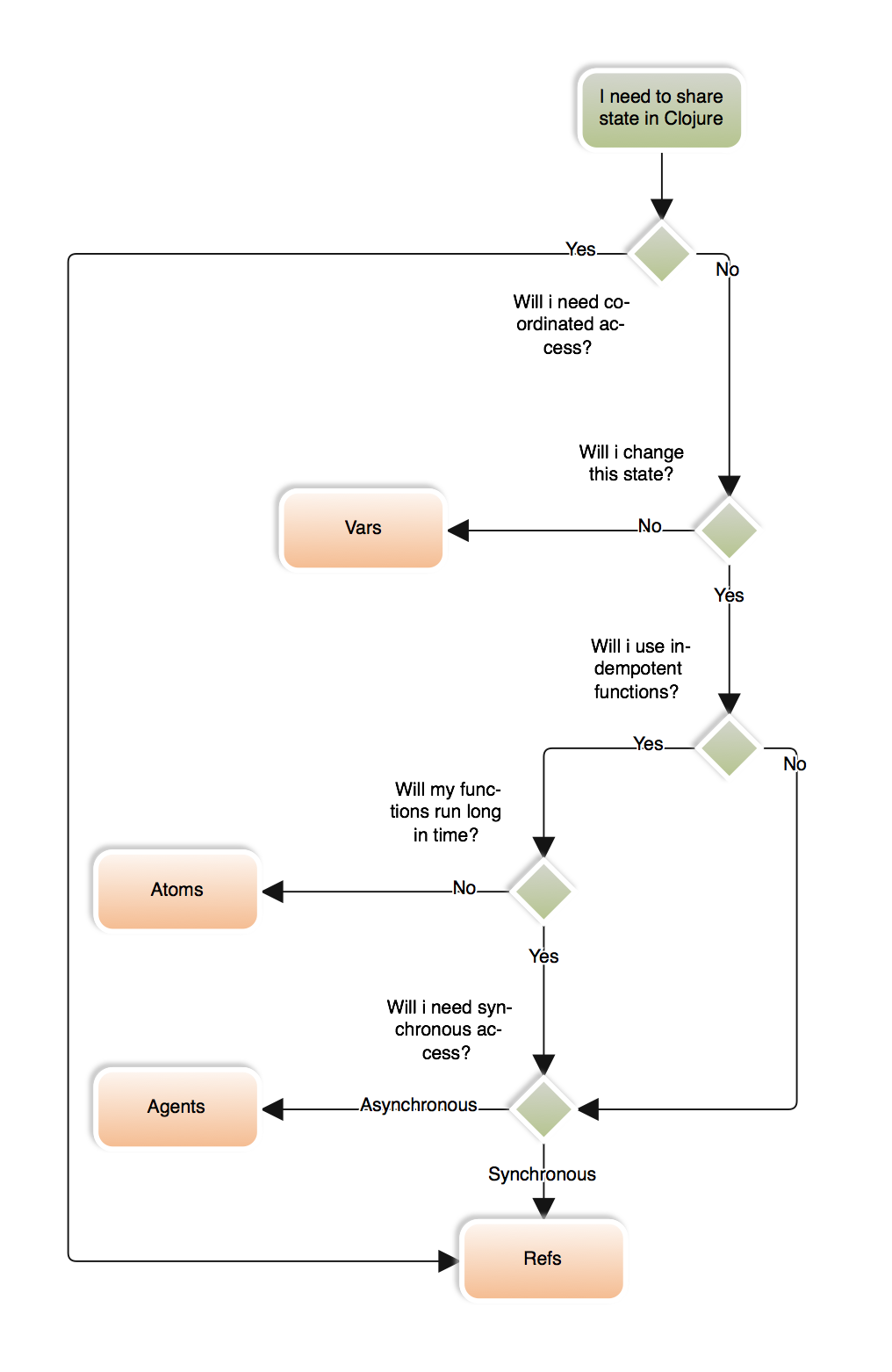Share state - when to use vars, atoms, agents and refs?
Use cases and flowchart helping decide when to use vars, atoms, agents and refs.
Vars
Vars are global for every threads.
They are the most common references which we use every day.
(def x 1)When we do (def foo "bar") all threads will share foo. It is not a problem because Clojure use immutable data structures.
(go
(def foo :bar))
(Thread/sleep 1000)
foo
=> :barDo not change vars after creating. It is technically possible, but it is a bad idea for many reasons.
Atoms
Share access to mutable state for every thread. Change occurs synchronously. Retry when other thread changes the state during run.
Atoms use compare-and-set model. It means that when more than one thread is trying to swap! the atom, they will have conflict and loop the function as long as compare-and-set passes.
So what (swap! foo-atom inc) really does?
1. Read value from a foo-atom as an old-value.
2. Do on this value inc function as a new-value.
3. Save the new-value only if foo-atom is still the old-value. If not, loop to the point 1! Unlimited times, as long as while saving the new-value atom will still have still old-value!
(def counter (atom 0))
(def foo (atom 1))
(defn slow-inc [n]
(swap! counter inc)
(Thread/sleep 200)
(inc n))
(pmap
(fn [_]
(swap! foo slow-inc))
(range 100))
@counter
@foo
=> 1602
=> 101What happens here? pmap works parallel, so all threads at “the same time” are doing swap! foo. Each time when do slow-inc, also increase the counter with very fast inc. So probability of conflict during swap! counter is very low, but still rules are the same. But during slow-inc probability of conflict while saving a new-value is very high.
- The fastest swap! does
incon the foo atom from 1 to 2. - Others did the same operation and tried to save a new value. While saving the new value 2, compare an old value, excepting the value 1 (read the value at the beginning), however receive value 2 (other thread changed the atom). So all threads retry, read actual value 2 and inc them to 3.
- The fastest swap!
incthe atom from 2 to 3. - …
Do not use not idempotent functions and functions with long time execution
Agents
Share access to mutable state for every thread. Change occurs asynchronously.
Work similar to atom, but instead of retry every time when compare-and-set! don’t pass wait in the queue in the order they were sent, so conflict will never happen. Functions never retry, but when you send function you never know when it will be run. The function will be waiting in the queue.
(def foo-agent (agent 1))
(defn slow-inc [n]
(swap! counter inc)
(Thread/sleep 2000)
(inc n))
(do
(send foo-agent slow-inc)
(send foo-agent slow-inc)
(println @foo-agent)
(Thread/sleep 2500)
(println @foo-agent)
(Thread/sleep 2500)
(println @foo-agent))
1
2
3- First,
sendrun and doslow-inc. - Second
sendwait in the queue. It was sent to the agent and program doesn’t care about that any more. Run next lines. - Print value 1, because first
sendhasn’t finished yet. - Wait and print value 2, because first
sendfinished. Secondsendstarted counting just after first one, but didn’t finish yet. - Wait and print 3, because second
sendfinished.
Refs
Refs works similar to database transactions. Write and read are protect in dosync. You can operate on many refs safe in transaction.
(def foo (ref 0))
(def bar (ref 0))
(go
(dotimes [_ 10]
(dosync
(alter foo inc)
(Thread/sleep 1000)
(alter bar inc)
(println "updated, foo:" @foo "bar:" @bar))))
(go
(dotimes [_ 10]
(dosync
(println "read, foo:" @foo "bar:" @bar))
(Thread/sleep 1000)))
read, foo: 0 bar: 0
updated, foo: 1 bar: 1
read, foo: 1 bar: 1
updated, foo: 2 bar: 2
read, foo: 2 bar: 2
updated, foo: 3 bar: 3
read, foo: 3 bar: 3
updated, foo: 4 bar: 4
read, foo: 4 bar: 4
updated, foo: 5 bar: 5
read, foo: 5 bar: 5
updated, foo: 6 bar: 6
read, foo: 6 bar: 6
updated, foo: 7 bar: 7
read, foo: 7 bar: 7
updated, foo: 8 bar: 8
read, foo: 8 bar: 8
updated, foo: 9 bar: 9
read, foo: 8 bar: 8
updated, foo: 10 bar: 10As we can see ,we can change many refs in one transaction and commit this changes like in database after whole dosync.
The choice flowchart
So at least, when to use which one?
Idempotent operation is the one that has no additional effect if it is called more than once with the same input parameters.
Coordinated access is used when two Identities need to be changed together, the classic example is moving money from one bank account to another, it needs to either move completely or not at all.
Uncoordinated access is used when only one Identity needs to update, this is a very common case.
Synchronous access is where the call expects to wait until all the identities are settled before continuing.
Asynchronous access is “fire and forget” and let the Identity reach its new state in its own time.

